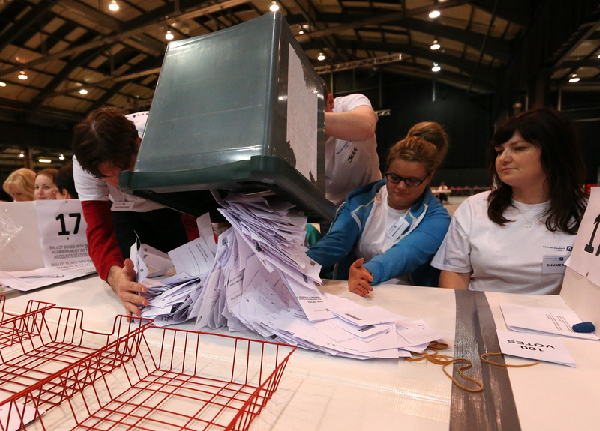 |
|
Ballot boxes are opened as counting begins in the Scottish Independence Referendum for the Aberdeenshire Council area, Aberdeen, Scotland, Sept 18, 2014. [Photo/IC] |
Scotland's verdict on the union should be clear around breakfast time on Friday, but a YouGov poll of 1,828 voters the organisation had previously polled indicated 54 percent of Scots would back the union while 46 percent would seek independence.
First partial results showed unionists won the Clackmannanshire region, which represents just under one percent of the electorate, with 54 percent against 46 percent of the vote.
"It looks like the union will remain intact for the time being," YouGov research manager Laurence Janta-Lipinski told Reuters of the survey carried out on Thursday which was not an exit poll.
Sterling rose to a 2-week high against the US dollar in response. Banks in London manned trading desks through the night to track the result.
YouGov said it had picked up a "small but significant late swing" towards supporters of the 307-year union between Scotland and England on polling day, though it cautioned the survey was merely a snapshot.
The campaign for independence has galvanised this country of 5.3 million but also divided the passions of friends and families from the remote Scottish islands of the Atlantic to the tough city estates of Glasgow.
Breaking apart the United Kingdom has worried allies, investors and the entire British elite whose leaders rushed late in the campaign to check what opinion polls showed was a surge in support for independence.
Seeking to tap into a cocktail of historical rivalry, opposing political tastes and a perception that London has mismanaged Scotland, nationalists say Scots, not London, should rule Scotland to build a wealthier and fairer country.
Unionists say independence would usher in financial, economic and political uncertainty and diminish the UK's standing in the world. They have warned that Scotland would not keep the pound as part of a formal currency union.
Beyond the money and power, the referendum has provoked deep passions in Scotland, drawn in many voters who ignore traditional political campaigns and underscored what London politicians admit is a need for wider constitutional change.
Voters lined up at polling stations across Scotland to vote with 4.28 million voters, or 97 percent of the electorate, registered to vote.
